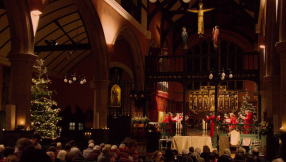
The Court of Appeal in London has today legally recognised the right of Christians to observe Sunday as a day of rest.
The court was ruling on the case of Celestina Mba, a 38-year-old care worker from Merton, south west London, was forced to leave her job when she refused to work on Sunday for religious reasons.
An employment tribunal had previously argued that because not all Christians observe Sunday as a day of rest, it could not be considered a "core component" of the Christian faith, despite it being the fourth of the Ten Commandments listed in Exodus chapter 20.
However, the Court of Appeal today rejected this notion, arguing that Sunday observance is an important part of the worship and practices of many millions of Christians, and cannot therefore be simply dismissed.
Employers have a responsibility to be conscientious and to work to find a balance between their business needs and an employee's religious obligations, the court judged.
Had this judgement gone differently, Christians who objected to working on Sundays in the future could have found themselves without a legal defence.
Andrea Minichiello Williams, barrister and director of the Christian Legal Centre, said: "At last the courts are beginning to demonstrate greater understanding of what it means to be a Christian.
"Christian identity extends beyond private belief into daily life. We pray that the tide is turning.
"Many Christians will now be able to argue that their employer must respect their rights of Sabbath worship"
Ms Mba resigned from her job at a children's home run by Merton Council in 2009 after being pressured to work on Sundays.
The initial employment tribunal found that as a 'committed Christian' she had made it clear that she was unable to work Sunday shifts because of her beliefs.
Although the Council initially respected this decision, two years later they approached her requesting that the arrangement be altered. From 2009 onwards, despite knowing she would refuse, Ms Mba's employers ordered her to work on Sundays.
Describing the situation, Ms Mba said: "They were trying to break my faith and see if I really believed in the Lord's Day. Merton disrespected my Christian faith. I said to the Court that the Council would not treat other faiths like they treat Christians. It was like giving pork to a Muslim every meal-time and then disciplining them for not eating it.
"If they really needed someone to work on a Sunday, they should have recruited that person and I would have been glad to leave. I had offered to take unpopular shifts and work anti-socials in order to protect Sundays."

The Court of Appeal decided it was wrong of the employment tribunals to have judged against Ms Mba on the basis of whether other Christians were observing Sundays as a day of rest.
Lord Justice Maurice Kay said: "I am satisfied that there was an error of law in the decision of the [employment tribunal] and that it was repeated in the judgment of the [employment appeals tribunal]."
Although future rights of Christians to refuse to work on Sunday have now been protected, the Court of Appeal's judgement was not retroactive, and therefore did not force Merton Council to provide Ms Mba with her job back.
The Appeals court was unwilling to reconsider the findings of the initial employment tribunal, or to order a new hearing to apply the correct tests to the case.
Lord Justice Maurice Kay said "after the most anxious consideration", he had come to the conclusion that the decision of the employment tribunal to uphold her dismissal was "proportionate" based on the law as it stood that time.
Ms Mba's supporters have found this aspect frustrating, with Ms Williams saying: "We believe if the Court of Appeal had been prepared to consider the facts according to the correct test, Celestina would have won. The onus should be on the employer to reasonably accommodate their employee."
She added: "[Ms Mba] loved her job and she has paid a high price for her Christian faith."














